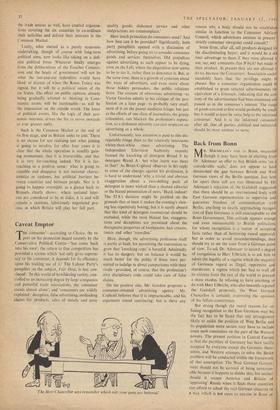Caveat Emptor .
"THE consumer'—according to Choice, the re- 1 port on his protection issued recently' by the Conservative Political Centre—'has come back into his own'; the return to free competition has provided a system which 'not only gives suprem- acy to the consumer; it depends for its efficiency upon his making use of it.' The Labour Party's. pamphlet on the subject, Fair Deal, is less con- vinced : 'In this world of bewildering.variety, con- trolled to an increasing degree by large companies and powerful trade associations, the consumer stands almost alone; and 'consumers are widely exploited : deception, false advertising, misleading claims for products, sales of unsafe and poor quality - goods, dishonest service and other malpractices are commonplace.'
How much protection do consumers need? And how best can it be provided? Significantly, both party pamphlets opened with a discussion of advertising, before going on to consider consumer goods and services themselves. Old prejudices against advertising as such appear to be dying, even on the Left, where the disposition now seems to be to tax it, rather than to denounce it. But, at the same time, there is a growth of cynicism about the ways of advertisers, and even more about those hidden persuaders, the public relations firms. The amount of obnoxious advertising—as Victor Gordon admits in his critique of the pro- fession on a later page—is probably very small, most of it on the patent medicine fringe; 'but just as the efforts of one class of journalists, the gossip columnists, can blacken the profession's reputa- tion, so a dishonest minority can east suspicion on advertising as a whole.
Unfortunately, less attention is paid to this dis- reputable fringe than to the relatively innocuous whiter-than-white mass advertising. The Independent Television Authority recently banned the knocking of detergent Brand X by detergent Brand A: but what harm was there in that? As Brian Copland observes in his reply to some of the charges against his profession, it is hard to understand •%% hy a trivial and obvious exaggeration -about a two-shilling pack of detergent is more wicked than a slanted editorial or the biased presentation of news.' Hard, indeed! The ITA's decision might be justified oh the grounds that at least it makes the evening's view- ing less repetitively boring; bUt it is surely absurd that this kind of detergent commercial should be excluded, while the most blatant lies, exaggera- tions and deceptions are permitted about the therapeutic properties of toothpastes, hair creams, tonics and other 'remedies.'
Here, though, the advertising profession itself is partly at fault, for permitting the convention to grow that 'knocking copy' is harmful. Admittedly it has its dangers; but on balance it would be much better for the public if firms were per- mitted to indulge in direct comparisons with their rivals—provided, of course, that the profession's own disciplinary code could take care of false claims.
On the positive side. Mr. Gordon proposes a consumer-oriented advertising agency. Mr. Copland believes that it is impracticable, and his arguments sound convincing: but is there any The Herr Chancellor says remember which side your guns are buttered.' reason why a body should not be establishe similar in function to the Consumer Adviso Council, which advertisers anxious to present strictly consumer viewpoint could consult?
Some firms, after all, sell products designed the discriminating buyer; and it would be a di tinct advantage to them if they were allowed t use, say, any comments that ll'hich? has made a their product. At present they are not allowed t do so, because the Consumers' Association under standably fears that the privilege might b. abused. But a consumer organisation could be established to grant selected advertisements thei equivalent of a kitemark, indicating that the con4 tents of the advertisement had been examined and passed as in the consumer's interest. The range ()I' goods covered at first would probably be s but it would at least be some help to the consumer. And it is the informed consumer, after all, that all parties. political and industrial, should be most anxious to serve.






























 Previous page
Previous page